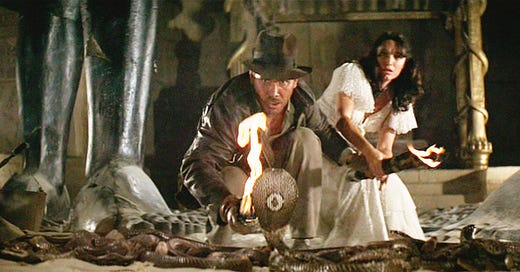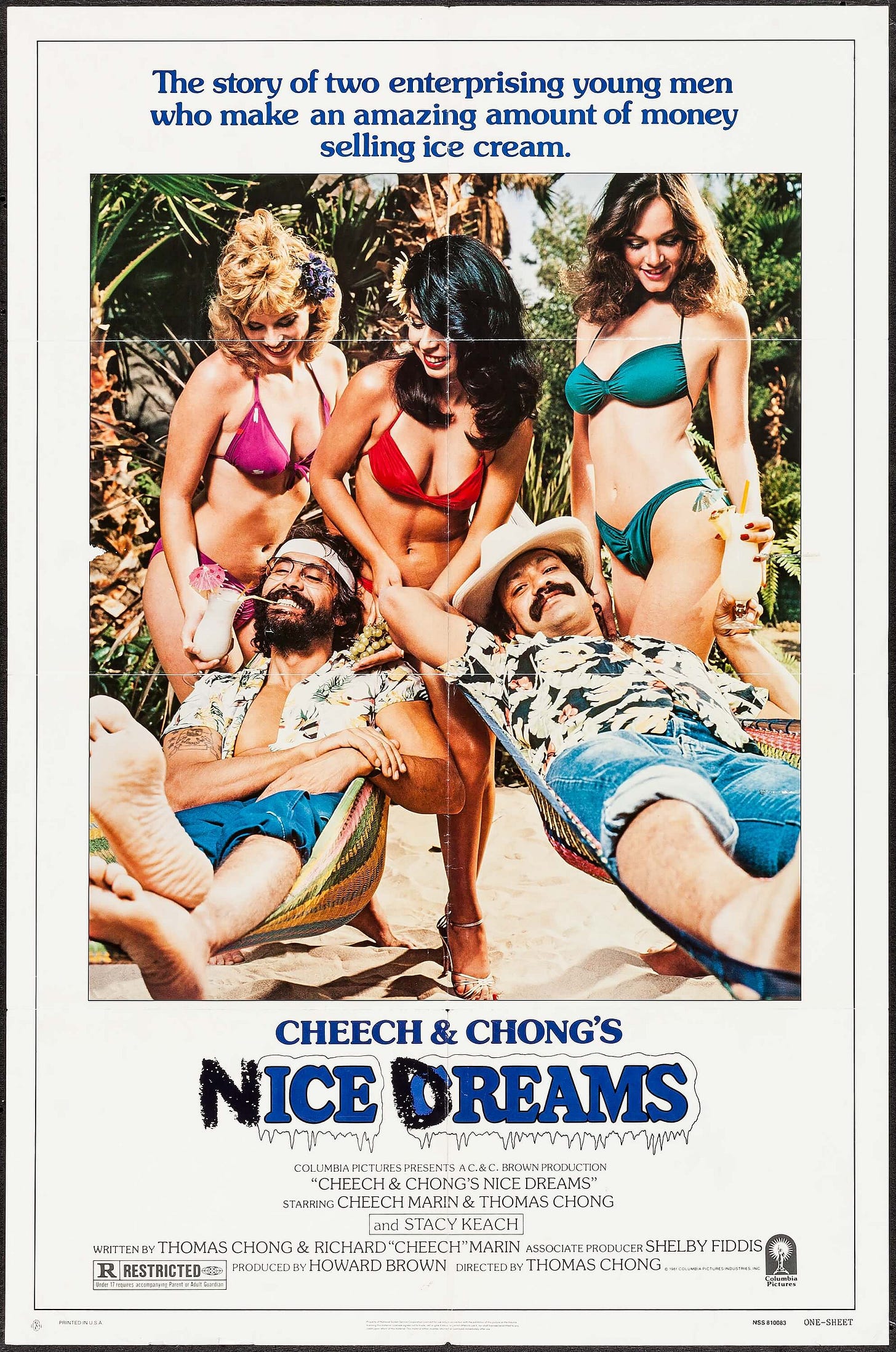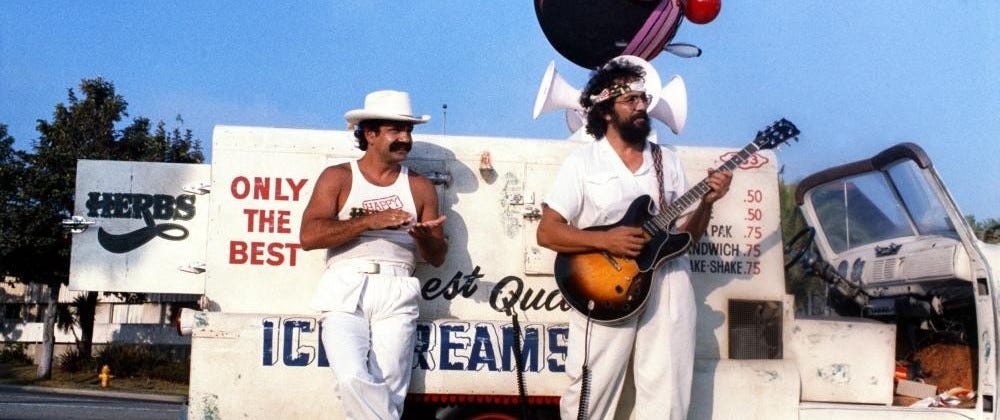June 1981 gets crazy with Cheech & Chong, Superman, Mel Brooks, Harryhausen, and Indiana freakin' Jones
All this plus James Bond and an underrated fantasy classic
The premise is simple, but the task is not. Every single movie released in the United States during the 1980s, reviewed in chronological order, published month by month.
Buckle up, because this is The Last ‘80s Newsletter You’ll Ever Need…
JUNE
Professional baseball players began what would become a 50-day strike, their third since the formation of the major leagues.
Steely Dan pulled the plug as a band, and Donald Fagan and Walter Becker went their separate ways.
The AIDS epidemic officially began with reports of pneumonia affecting five gay patients in Los Angeles, according to the US Centers for Disease Control.
And, finally, Barbara Walters unforgettably asked Katharine Hepburn what kind of tree she was. She preferred oak to elm.
This feels like the biggest month for this newsletter so far, and I am a little bit stressed out about doing justice to the unbelievable line-up of movies we’re going to discuss.
I was so movie-crazy as June 1981 rolled around, and one of the first films I was excited to see was, oddly enough, The Night The Lights Went Out In Georgia. Keep in mind, I was living in Chattanooga, TN, and they shot a good deal of the film in and around our area. That meant that at some point, Luke Skywalker was in the same general area I was. That was thrilling to me because it made the impossible dream of Hollywood filmmaking seem a little more tangible and possible to me. But the rest of the line-up for this month had me positively frothing as the month began.
One of my most vivid memories from June of 1981 took place at the community pool in my neighborhood. We lived in a subdivision called Mountain Shadows, and there was a pool that you could use if you paid your membership fees. We lived in that pool each summer, and all of my friends and their families in our neighborhood were the same way. When I close my eyes, I can still hear the sound of everyone laughing and yelling and talking, and I can smell the chlorine and I can hear the sound of the soda machines on the patio. One afternoon, we went to the pool after running errands all morning, one of which took us to the pharmacy near my house that had the best newsstand in the area. I picked up the Marvel comics adaptations of both For Your Eyes Only and Raiders of the Lost Ark one afternoon. Neither film was out yet, but it’s safe to say I was rabid about both of them. I was a newly-minted James Bond fan, after all. I saw both The Spy Who Loved Me and Moonraker in theaters, and I was excited to have Bond in the mix that summer. But whatever excitement I felt about that was magnified tenfold for a new film from both George Lucas and Steven Spielberg. My Raiders piece this month is the longest single review I’ve included in this newsletter so far, but it’s Raiders of the Lost Ark, so that seems appropriate.
The entire month was this fever dream of movie fandom, though. I can’t even explain how crazy audiences went in the theater for Superman II, especially during the big New York fight scenes at the end. It was wild. I was eleven this summer, and that’s such a weird age. I was equally excited about seeing both Stripes and The Great Muppet Caper. There was no difference to me in those movies. Both were big comedies starring people I loved from the TV. Bill Murray was already important to me because of Meatballs, and I started a major offensive designed to get my mom to take me to see the movie. I figured I didn’t have a chance when it came to my dad, who was not a big fan of subversive comedy that challenged authority. Somehow, though, it took only a wee tiny bit of effort on my part to convince the entire family to go see the film while we were on vacation in Memphis. He later told me it was because it was about the Army, which he always advocated for as a possible career path for me because of his own experience with the service. I’m not sure the film delivered quite the message he’d hoped, though.
Summer was a great time for me as a film fan because we would spend a good deal of time with my grandmothers, who lived in Memphis, and the primary way they communicated with me was through movies. My extended family also lived in the area, and one of my proudest accomplishments of the summer was managing to see Cheech & Chong’s Nice Dreams and Clash of the Titans on the same weekend thanks to my aunt and uncle (who realized what a profound mistake they had made about 10 minutes into the film) and my grandmother (who did not care for Medusa in any way, shape, or form) and somehow not getting in trouble for talking my way into the R-rated one. There were so many R-rated films that I got to see at this point that it felt like I was winning the war. I’m sure my parents would have been very upset with me seeing Cheech & Chong theatrically, and doubly irritated that I would even want to see the film.
Part of the weird game of my childhood was trying to figure out what made one thing forbidden and another thing allowed, and this month was a perfect example. By this point, I had already seen Young Frankenstein and Blazing Saddles, and my parents showed me both of them. They loved those movies. We saw Young Frankenstein during a late ‘70s theatrical re-release and Blazing Saddles was a film they rented repeatedly on video during the very early days of us having a VHS player in the house. I love Mel Brooks, so this is not a slam on him, but I couldn’t figure out why my parents were okay with the outrageous sensibility of Blazing Saddles but upset by the mayhem in Up in Smoke. I could never quite figure out why Animal House was beloved but Neighbors caused my dad to kick a VCR because he was so upset by what was happening. It felt like there was no particular rhyme or reason, but once I knew they liked something, I’d lean in, and that’s how I ended up in a theater for History of the World Part I with both of my parents.
If Raiders was the event of the summer for me, then clearly the event of the summer for my father was The Cannonball Run. Even more than James Bond, Burt Reynolds was an icon among icons in my house, and Smokey and the Bandit was every bit as big a movie for my dad as Star Wars was for me in the summer of ’77. I enjoyed the Burt Reynolds films at first because my parents enjoyed them. I went to Smokey and Hooper and The Cannonball Run because my parents went. That policy was going to backfire disastrously later in ’81, but at this point, Reynolds was still on the “Of course we’ll go see that” list and The Cannonball Run had all those other movie stars my parents loved on top of that. They loved the Rat Pack, and at one point, we briefly lived next door to Farrah Fawcett’s parents in Texas, so they always seemed personally invested in seeing her succeed.
We learn about the generation before us from our parents and the way they interact with pop culture. There are so many things that I absorbed by osmosis, and one of the reasons a month like June 1981 stands out in my memory was because of that feeling that I was starting to carve out my own path through pop culture. I was choosing what I wanted to see, and my reactions were not always the same as the reactions my parents had, and that process is important as you’re developing your taste in movies or music or television or whatever. I don’t know if I was “excited” for The Cannonball Run, but at age 11, I was pretty much wide open, and anything I could see, I would see. There was a baseline level of interest I had in movies, and it was kind of manic, this omnivorous appetite of mine. I had the novelization for The Cannonball Run. Bought it in a store. I will let that sink in. I intentionally picked up a book version of a Hal Needham film and said, “Yes, I think this is a worthwhile experience.” I was curious about some of the casting choices, like Jackie Chan, who had not made enough of a cultural impression in America yet to break through to my hyper-white little enclave of Chattanooga. There was no doubt that the primary draw was Burt, though, and we saw it opening weekend, and it was just as “big” an event with my family as Raiders was.
Not for me, personally, of course. Raiders was an accelerant tossed on a flame that was already out of control. I needed to understand the magic trick of that film, and I spent the rest of the summer figuring out how many times I could get someone to take me back to a theater where it was playing. It blows my mind that I saw as many of these in the theater as I did. I can only thank my parents for being as encouraging and accommodating as they were, and for allowing me to play my various shell games designed to get me into as many screenings of as many movies as I could see.
JUNE 5
Cheech & Chong’s Nice Dreams
Tommy Chong, Cheech Marin, Benita Barrie, Sandra Bernhard, Big Yank, Don Carlson, David Castle, Jerry Chambers, Jennifer Child, Shelby Chong, Tony Cox, Roderick F. Daniels, James William Newport, James Faracci, Lorraine Fiorito, Mickey Fox, Frances Gray, Evelyn Guerrero, Jeff Imada, Peter Jason, Sally Julian, Solomon Karriem, Stacy Keach, Suzanne Kent, Irvin “Zabo” Koszewski, Danny Kwan, Michael Lansing, Timothy Leary, Bob Leslie, Robert “Big Buck” Maffei, Rikki Marin, Sally Marr, Michael Masters, David McCharen, Bill McLean, Gregory Polcyn, Haydee Pomar, Jeff Pomerantz, Linnea Quigley, Paul Reubens, Peter Risch, Spray Rosso, Tim Rossovich, Roselyn Royce, Malcolm C. Scott, Sab Shimono, Cheryl Smith, Howlett Smith, Roosevelt Smith, Shirley Spanger, Debbie Tressler, Victoria Wells, Michael Winslow, Charlie Young, Marlena Amey, Levin Bailey
cinematography by Charles Correl
music by Harry Betts
screenplay by Thomas Chong & Richard “Cheech” Marin
produced by Howard Brown
directed by Thomas Chong
Rated R
1 hr 28 mins
Two enterprising LA residents start a small business, lose all their money, and then find it again.
We’ve talked about Cheech and Chong once before, in our July 1980 issue, and less than a year later, they’re back with the last of their early run of three loose and funny movies. All of these early films were populated with Los Angeles comics who they knew from The Groundlings or from the local club scene, and the films were clearly just designed to give you a series of comedy bits that only share the slightest connective tissue.
Up in Smoke is still the best thing they ever made. I don’t even think it’s a close discussion. It’s better made and there’s just the slightest bit of focus that makes it feel a little bit more like a “real” movie. The thing that both Next Movie and Nice Dreams have going for them is a sprawling talent pool that is represented in the supporting cast. If you’re a Paul Reubens fan, you’ve got to see this just to see his exceedingly strange and funny turn as Hamburger Man, a cocaine dealer who manages to hoodwink the boys out of a check for 17 million dollars. How they got the money and how they get the money back is nonsense, and so is the entire running subplot about Stacy Keach, returning here as Sgt. Stedenko, the cop from Up In Smoke. In this film, we see that Stedenko has become a secret stoner, smoking everything he seizes. He’s got a few new bumbling sidekicks this time, Drooler (Peter Jason) and Noodles (Tim Rossovich), and they’re the ones actually out in the field, tailing Cheech and Chong and gathering up samples of the product they’re selling out of their ice cream truck. It seems like the stuff they’re selling was created by Weird Jimmy (James Newport) is turning people into lizards if they smoke enough of it, and Keach does a long slow transformation, complete with animated tongue and green make-up, as the film progresses.
By the time they meet the Hamburger Man, who appears to be an escapee from a local asylum who is also a coke dealer, it’s clear that they’re not even trying to tell a story. Chong trades the Hamburger Man all of their money for a check, and the rest of the film is ostensibly about getting that check back, but there are non-stop digressions. The lengthiest involves Donna (Evelyn Guerrero, the other recurring character in the first three films) and Cheech’s eternal attempts to go to bed with her. There’s a long sequence here where Donna takes both of them home for a threeway, only to have her just-escaped-from-prison husband Animal (Michael Masters) show up and go on a violent rampage. Cheech spends a good deal of time hanging off of a glass elevator completely naked and Chong just barely evades grievous bodily harm. There’s a trip to an actual asylum filled with some wild cameo appearances, a drop-in by Timothy Leary, and Michael Winslow making crazy sounds. It’s a loose and goofy film that definitely feels like the formula is already starting to wear thin. Shot from a three-page outline, the film feels like it, and I wish the guys worked with a filmmaker who could handle crafting a solid framework for them, allowing them to just focus on being funny. I think Chong’s slapdash direction does them both a disservice. He’s not terrible, but considering how good Up in Smoke looks in 2.35:1, it is disappointing to see how quickly the guys just kind of gave up on making their films visually appealing at all.
Keep reading with a 7-day free trial
Subscribe to The Last '80s Newsletter (You'll Ever Need) to keep reading this post and get 7 days of free access to the full post archives.





